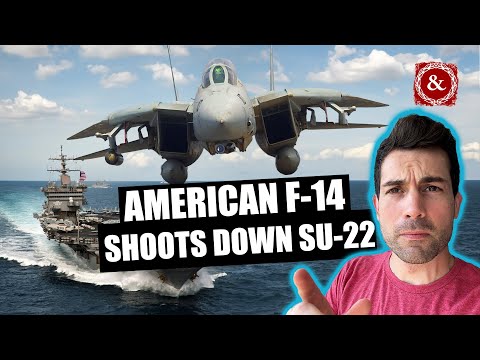Head to my link, https://drinkag1.com/taskandpurpose, to get a FREE one-year supply of AG Vitamin D3+K2, plus five AG1 Travel Packs with your first purchase of AG1!
On August 19th 1981, two American F-14 Tomcats were caught in an intense air to air dogfight with a pair of Libyan Su-22 fighters. The Su-22’s got the drop on them and opened fire first. This engagement was the first time the unproven F-14 saw combat, and was instrumental in showing that the U.S. Navy was a way to enforce international law with force if needed while proving the F-14’s combat capabilities. In this video we’re going to talk about why Americans were fighting Libyans, how it all went down, and the insane engineering behind the F-14 that made it all possible.
Written by: Chris Cappy and Justin Taylor
Edited by: Arun
First introduced in 1974, the Grunman F-14 Tomcat was the American Navy’s primary air superiority fighter and naval interceptor aircraft. Designed to be carrier capable, it was a twin engine, variable-sweep wing aircraft, that replaced the aging F-4 phantoms in the fleet.
Each cost the Navy about $38 million at the time, adjusted for inflation that’s $135.5 million in today’s money, and was the first fourth generation aircraft in the American arsenal, also nicknamed the “teen series” with the F-15, 16, and F/A-18 following the Tomcat later.
In 1973, Libyan dictator and future head of the Condoleeza Rice fan club, Muammar Gaddafi cut off international access to the Gulf of (SID-rah) Sidra, a massive 22,000 square mile section of the mediterranean off of Libya’s northern coast. His military forces aggressively policed the area, and Gaddafi declared the demarcation line along the border of the Gulf as “The Line of Death.”. Between 1973 and 1980, Libya’s military would often harass nearby American and NATO navies stationed in the Mediterranean, however the United States did not recognize Gaddafi’s claims of ownership in the Gulf, and asserted that it was still considered international waters.
When countries, especially dictatorships, claim to own a piece of the ocean that falls outside of their national borders, the normal response from other countries wanting to sail in said water is what’s called a Freedom of Navigation operation, or FON. These usually consist of Navy battle groups being sent into the contested areas in question and saying “What are you gonna do about it?” National claims become a lot fuzzier in the ocean compared to clear land borders, and according to the United Nations Convention on the Law of the Sea, territorial waters only extend 12 nautical miles off the coast. Navies around the world use Freedom of Navigation ops as a way to ensure countries don’t start claiming crazy amounts of the ocean for themselves, and things like international trade don’t get disrupted.
Join this channel to get access to perks:
https://www.youtube.com/channel/UCSq3p5NKEtyp5Rjd4ctiEbg/join
Task & Purpose is a military news and culture oriented channel. We want to foster discussion about the defense industry.
Email capelluto@taskandpurpose.com for inquires.
#AIRCRAFT #WAR #STORY


